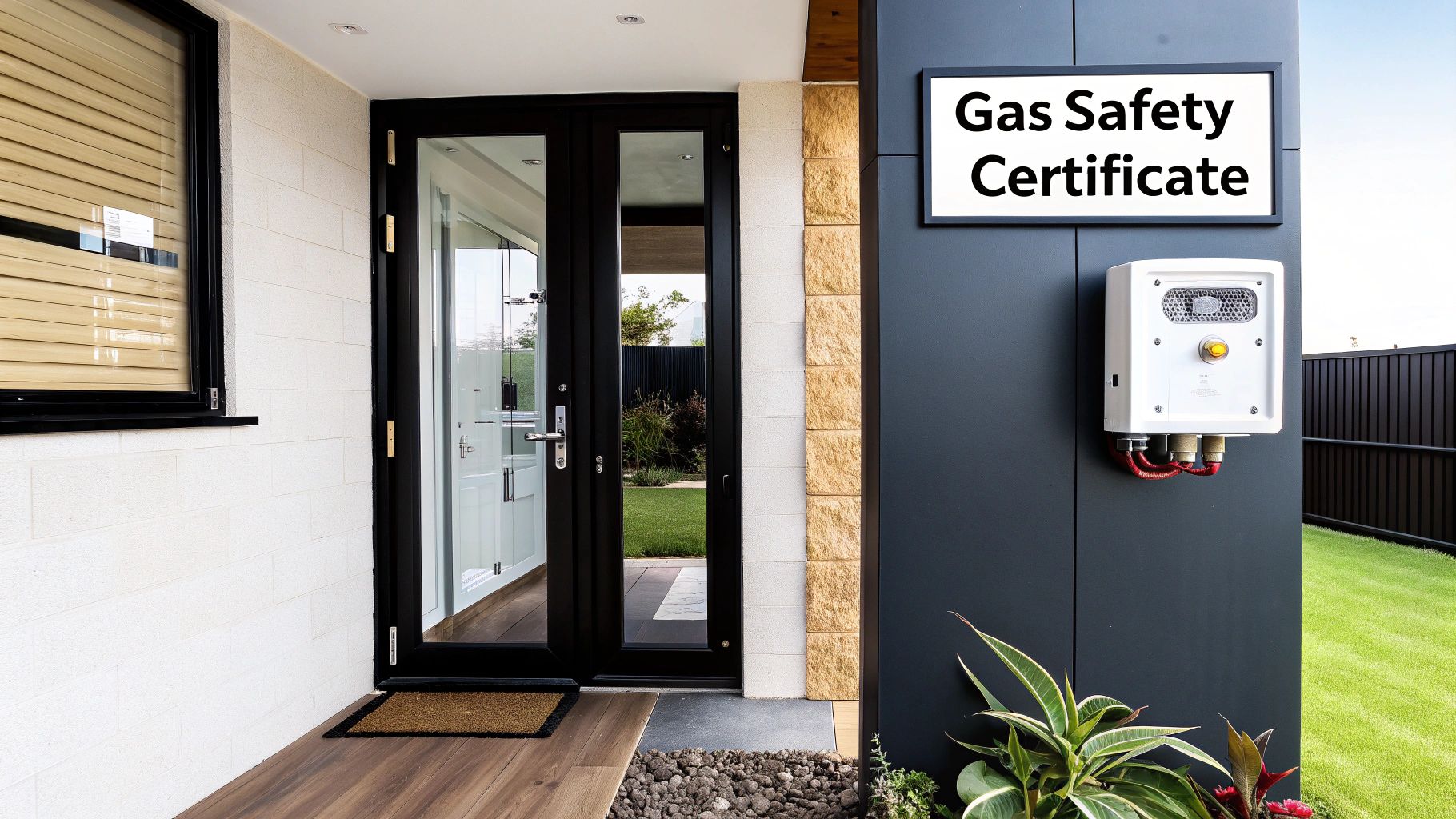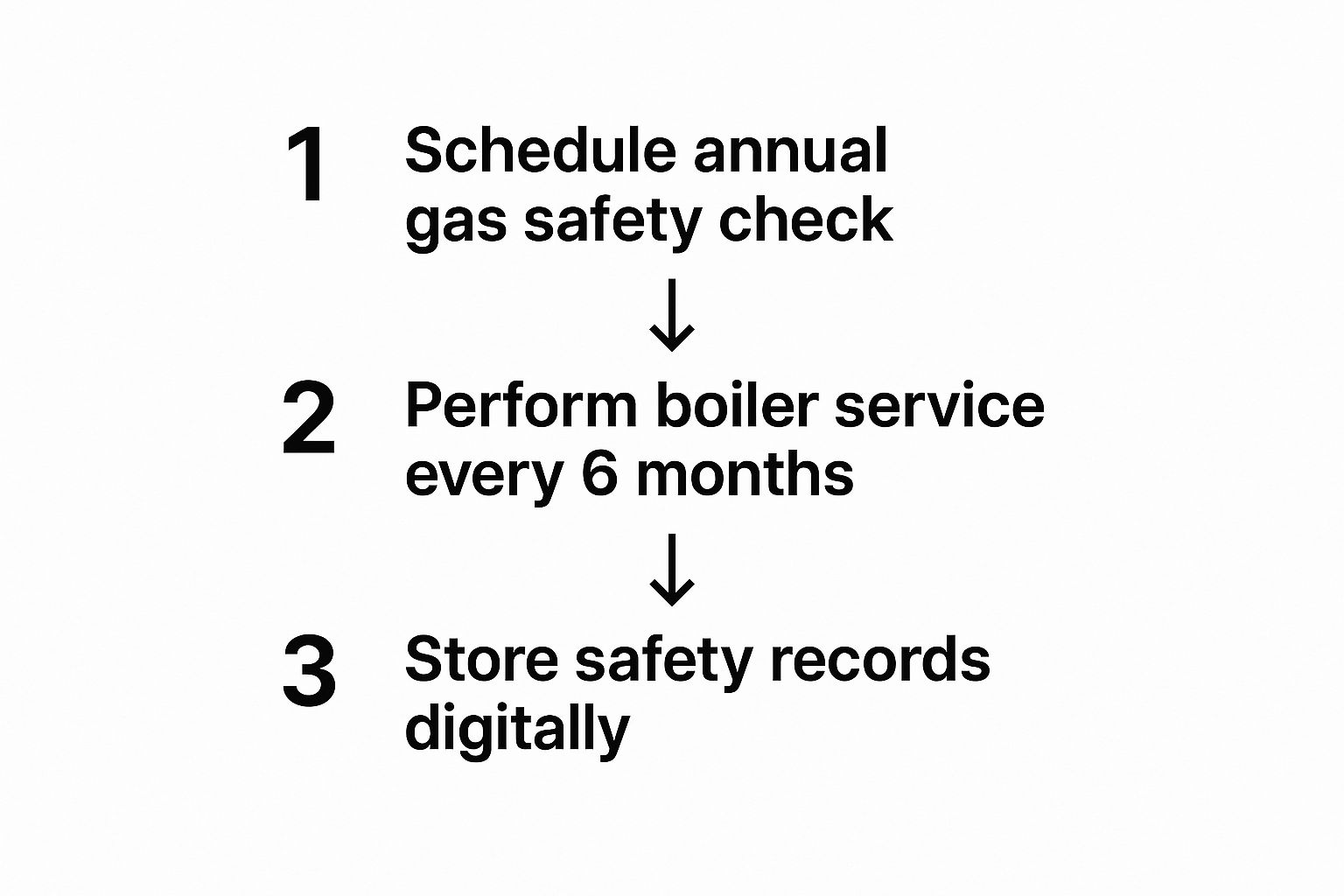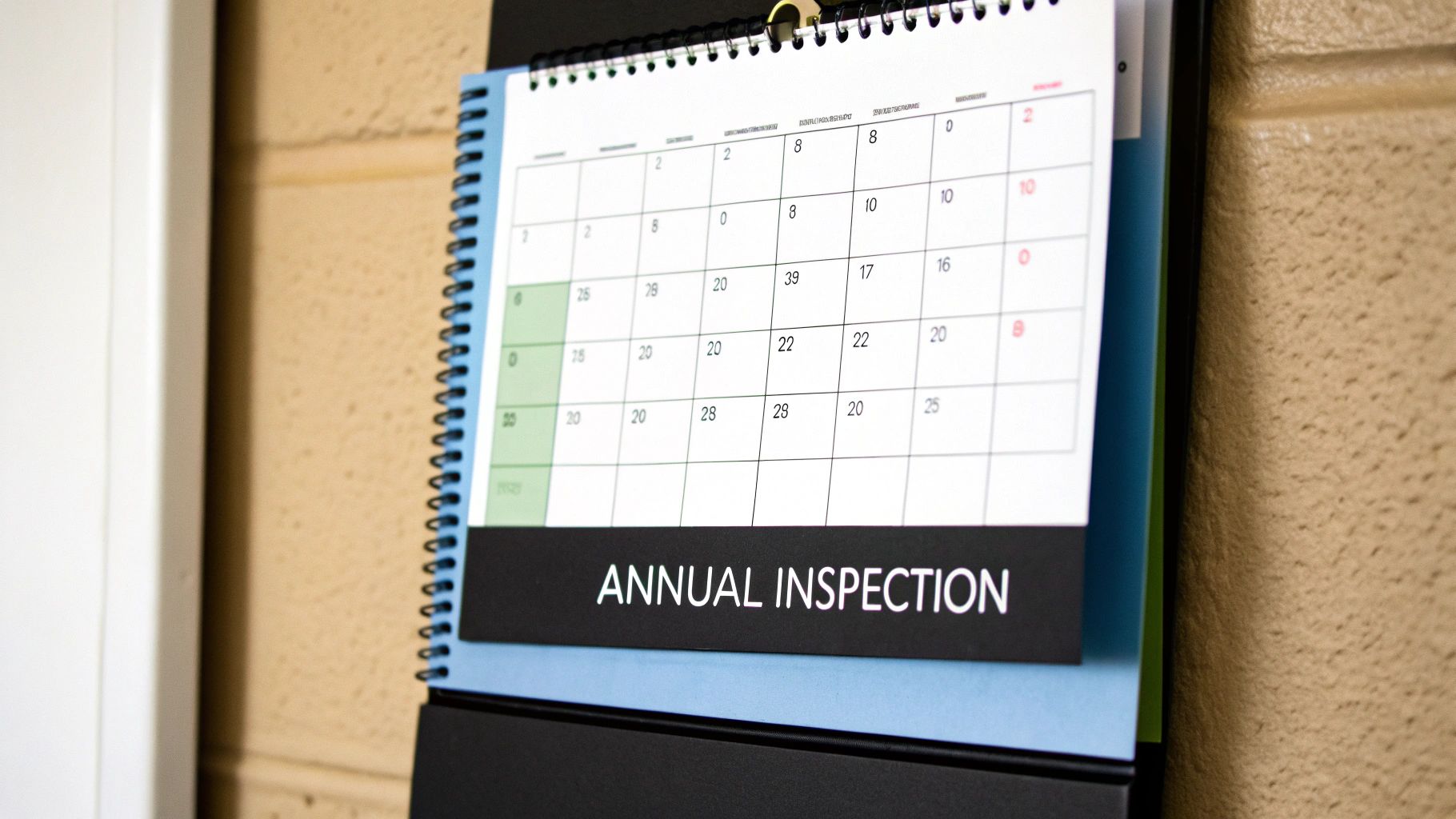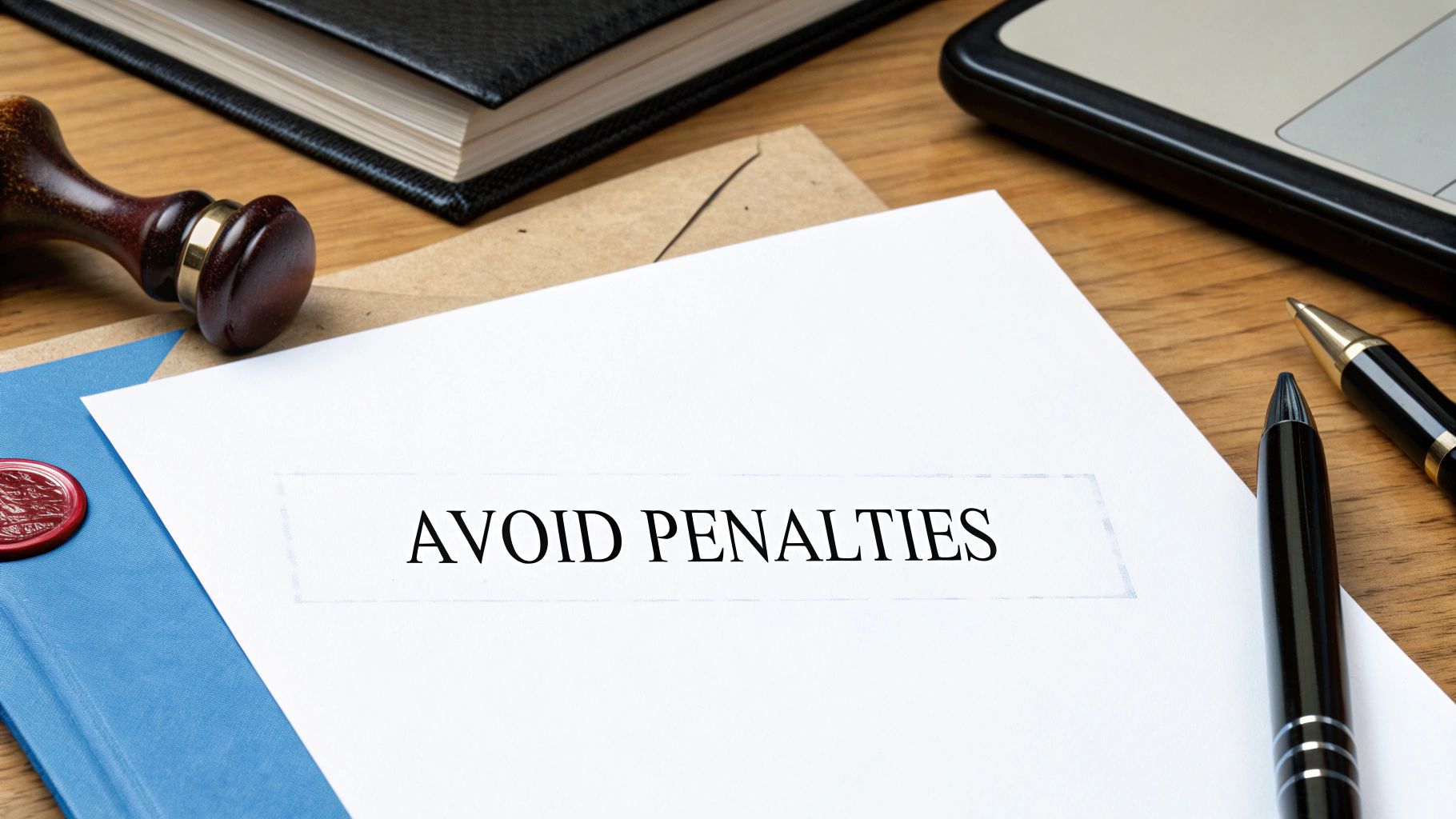Landlord Gas Safety Certificate and Boiler Service | Stay Compliant
- Luke Yeates
- Oct 8, 2025
- 13 min read
As a landlord, keeping your property's gas appliances in safe working order is more than just good practice—it's one of your most critical legal duties. This responsibility boils down to two key things: the landlord gas safety certificate and the annual boiler service. The certificate (often called a CP12) is your proof of safety, while the service keeps everything running efficiently and reliably, preventing those dreaded winter breakdowns in your Eastbourne rental property.
Getting to Grips with Your Gas Safety Obligations

Navigating the Gas Safety (Installation and Use) Regulations 1998 might seem intimidating at first, but the rules are actually quite straightforward. At its core, the law exists to protect your tenants from the very real dangers of faulty gas appliances, like fires, explosions, and carbon monoxide poisoning.
The main requirement is an annual gas safety check, which must be carried out by a Gas Safe registered engineer. This inspection results in the Landlord Gas Safety Certificate (CP12), your official record confirming that all gas appliances, pipework, and flues in the property are safe to use.
Your Core Legal Duties
To stay on the right side of the law, there are three clear rules you have to follow. These aren't just suggestions; they are legal necessities that protect both you and your tenants. Think of it this way: if you own a rental flat in Eastbourne’s Old Town or a student house in Meads, these steps are as fundamental as collecting the rent.
Here's a breakdown of your main responsibilities:
Annual Checks: You must get a Gas Safe engineer to inspect every gas appliance and flue at least once every 12 months.
New Tenants: A copy of the current gas safety certificate must be given to new tenants before they move in. No exceptions.
Existing Tenants: For tenants already in the property, you must provide them with a copy of the new certificate within 28 days of the check being completed.
Juggling all the tasks that come with being a landlord can be a lot, but gas safety is one area you absolutely can't afford to overlook. Taking a proactive approach doesn't just keep you compliant; it shows your tenants you care about their wellbeing, which helps build trust and encourages longer tenancies.
The Heavy Price of Non-Compliance
The penalties for cutting corners on gas safety are severe. Landlords can be hit with fines of up to £6,000 or even face a prison sentence of up to six months for failing to comply. These regulations are enforced strictly for a reason—to prevent tragedies that are entirely avoidable.
It’s also worth noting that landlords of licensed HMO properties often have to meet even stricter safety standards. For example, a landlord managing student lets near the University of Brighton's Eastbourne campus would need to be especially diligent.
To make this whole process simpler, many landlords in Eastbourne work with a local firm like Harrlie Plumbing and Heating. We can schedule a combined landlord gas safety certificate and boiler service in a single, efficient visit. This minimises disruption for your tenants and ensures all your legal boxes are ticked without any fuss. This consolidated approach saves you time and gives you complete peace of mind.
Gas Safety Check vs Boiler Service Explained
It’s a common mix-up among landlords, but your landlord gas safety certificate and a boiler service are not the same thing. Yes, they’re often done in the same visit to save time and hassle, but they have two completely different jobs. Getting this distinction right is crucial for looking after your property and, more importantly, ticking all the right legal boxes.
Think of it like this: the gas safety check, which gives you that all-important CP12 certificate, is your legal duty. Its one and only focus is safety. An engineer will inspect every gas appliance to make sure it’s working correctly, has proper ventilation, and isn’t leaking dangerous fumes like carbon monoxide. It's a straightforward pass-or-fail check designed to flag any immediate dangers.
A boiler service, however, is all about proactive maintenance. While it’s not a legal requirement, it is one of the smartest things you can do for the health of your heating system.
Diving Deeper into a Boiler Service
During a full boiler service, an engineer goes way beyond the basic safety checks. They'll get inside the boiler to physically clean key components, look for signs of wear and tear on crucial parts, and make fine adjustments to ensure it's running at its absolute best. This kind of preventative care nips small issues in the bud before they spiral into expensive, tenant-inconveniencing breakdowns.
Here’s an easy analogy: a gas safety check is like your car’s MOT – it just confirms the vehicle is safe to be on the road today. A boiler service is like getting the oil changed and the engine tuned up – it keeps the car running smoothly and reliably for the year ahead. You can see the full breakdown in our guide on how to service a boiler in Eastbourne.
To make it even clearer, let's break down the key differences.
Gas Safety Check vs Boiler Service at a Glance
Aspect | Gas Safety Certificate (CP12) | Annual Boiler Service |
|---|---|---|
Primary Goal | Legal safety compliance | Performance, efficiency, and longevity |
Legal Status | Mandatory by law for landlords | Highly recommended, but not legally required |
Key Tasks | Check for gas leaks, flue operation, ventilation, and safe combustion. | Clean internal components, check for wear, test pressure, and optimise performance. |
Outcome | A CP12 certificate (pass) or a warning notice (fail). | A more efficient, reliable boiler with a longer lifespan. |
Essentially, the CP12 keeps you legal, while the service protects your investment.
A Real-World Eastbourne Example
Let’s say you own a rental flat over in Sovereign Harbour. You book a gas safety check with Harrlie Plumbing and Heating to get your new CP12 certificate sorted. The engineer comes, confirms the boiler is operating safely, and issues the certificate. Job done, right?
Well, during the check, he also mentions that a few internal parts are showing early signs of corrosion. By only booking the safety check, you’ve met your legal obligation. But that corroded part could easily give up the ghost during a winter cold snap, leaving you with unhappy tenants, no heating, and a hefty emergency call-out bill.
If you’d authorised a full service at the same time, our engineer would have cleaned the system and replaced that worn part there and then, preventing a future disaster. It’s that proactive step that saves you money and stress in the long run.
This infographic breaks down a simple, effective workflow for managing both your legal and maintenance duties perfectly.

The real takeaway here is simple: bundling your annual gas safety check with a full boiler service is the most effective way to protect your tenants, your property, and your wallet.
Finding and Working with a Gas Safe Engineer

Getting your annual landlord gas safety certificate and boiler service sorted really comes down to one thing: the engineer you choose to hire. This isn’t a task you can hand off to just anyone. Your legal obligations and, more importantly, your tenants' safety are on the line, so it’s a decision that deserves proper attention.
The law is crystal clear on this. The only people legally allowed to work on gas appliances in the UK are engineers on the Gas Safe Register. Think of it as the official, government-approved list of qualified professionals. Before you even think about booking someone, your first port of call should always be the Gas Safe Register website to check their credentials.
Verifying the Right Qualifications
It’s not quite as simple as just finding someone on the register, though. You also need to make sure they’re actually qualified to work on the specific appliances in your rental property. This is a detail that’s easy to overlook but absolutely critical.
Let’s say you have a tenanted house in the Langney area of Eastbourne with a gas boiler in the kitchen and a separate gas hob. The engineer you hire needs to be qualified for both. Someone who is certified for boilers isn't automatically cleared to work on cookers or gas fires.
The back of every engineer's Gas Safe ID card lists exactly what they are trained and certified to handle. Always, always ask to see this card before any work begins. Any genuine, professional engineer from Harrlie Plumbing and Heating will expect you to ask and will be more than happy to show you.
Choosing a Trusted Local Company
So, you know how to check the paperwork. But how do you find a reliable local company in the first place? Your best bet is to look for an established Eastbourne firm with deep roots in the community. A company like Harrlie Plumbing and Heating, for instance, has built its reputation on trust, straightforward pricing, and a long list of positive local reviews.
When you start making calls, pay close attention to their customer service.
Clear Communication: Do they explain what’s involved without a lot of confusing jargon? Are they happy to answer your questions?
Transparent Pricing: Will they give you a clear, upfront quote for a combined gas safety check and boiler service, with no nasty surprises later?
Flexibility: How accommodating are they? Are they willing to liaise directly with your tenants to arrange a suitable time?
Finding a reliable local engineer is about more than just a certificate. It's about building a relationship with a company you can trust for routine maintenance, emergency call-outs, and honest advice, protecting your investment for years to come.
For more practical advice, we've put together some essential tips for finding the right plumber or heating engineer in Eastbourne that will help you make a confident choice.
Scheduling the Visit and What to Expect
Once you’ve found your engineer, it's time to get the appointment in the diary. Good communication with your tenant is absolutely vital here. By law, you must give them at least 24 hours' written notice before the visit. The best approach is to simply agree on a date and time that works for everyone to ensure the engineer can get access without any fuss.
On the day of the check, the engineer will carry out a series of tests on all gas appliances and flues. The whole process usually takes between 30 and 60 minutes, depending on how many appliances need checking. They'll be looking at things like gas tightness, proper ventilation, and flue performance, and they'll ensure all the safety devices are working as they should.
Once everything is finished, you’ll be issued the Gas Safety Certificate (also known as a CP12), which details all the results of the inspection.
Budgeting for Gas Safety and Service Costs
Getting a handle on the costs for your annual landlord gas safety certificate and boiler service is a crucial part of managing your rental’s finances. These checks are a legal must-have, but the price you’ll pay isn't fixed and hinges on a few key things.
The biggest factor is the number of gas appliances in the property. A simple check on a single boiler will always be cheaper than a full inspection on a house with a boiler, a gas hob, and maybe a gas fire too. Your location also plays a part, with prices varying a bit from region to region. As a general rule, you can expect a Gas Safety Certificate to cost somewhere between £60 and £90. Many engineers will then add a small fee, often around £10, for each extra appliance they need to check.
Practical Examples from Eastbourne
Let's bring this to life with a couple of local Eastbourne scenarios.
First, imagine you own a one-bedroom flat in the Meads area with just a combi boiler. Your gas safety check is going to be straightforward and will fall at the lower end of that price range.
Now, picture a larger, four-bedroom HMO over in Roselands. This property has a system boiler, a gas cooker with a hob, and a gas fire in the lounge. Naturally, the engineer has to inspect all three appliances, so the final bill will be higher to cover the extra time and work involved.
This is exactly why getting a clear, upfront quote from a local company like Harrlie Plumbing and Heating is so important. We can give you a fixed price based on your specific property, so you know precisely what to budget for with no nasty surprises.
The smartest move for any landlord is to bundle the annual gas safety check with a full boiler service. Booking both for a single visit is almost always cheaper than arranging two separate call-outs, saving you cash and causing less hassle for your tenants.
The Financial Benefits of Combined Packages
Opting for a combined package is more than just an upfront saving; it’s a strategic financial move. Regular servicing keeps the boiler running efficiently, which can trim down energy bills (a definite plus for your tenants). More importantly for you, it helps head off expensive emergency breakdowns right in the middle of a cold snap.
When you're mapping out your finances, it's worth checking out resources like A Landlord's Guide to Buy To Let Tax to see how mandatory expenses like these fit into the bigger picture. Treating your gas safety and servicing as a predictable, tax-deductible expense—rather than a reactive cost—helps you manage your investment much more effectively and keeps your property a safe and profitable asset.
Overcoming Common Compliance Hurdles

Even the most organised landlords can hit a wall when it’s time to arrange the annual landlord gas safety certificate and boiler service. The reality of being a landlord means dealing with real-world problems, from tenants who are tough to get hold of to navigating the stricter rules for Houses in Multiple Occupation (HMOs). These challenges can quickly throw your compliance schedule off course.
One of the biggest headaches we see time and again is simply getting access to the property. Tenants have their own lives, busy schedules, and sometimes they just forget appointments or become uncooperative. This puts you in a tight spot, because your legal responsibility doesn’t just vanish if you can't get your Gas Safe engineer through the door.
Creating a Solid Communication Trail
When you can't get in, the law says you must prove you’ve made every reasonable attempt to do so. This is where a solid paper trail becomes your best friend. You need to meticulously document every single phone call, email, text message, and formal letter you send to your tenant about the safety check.
Here’s a practical game plan to follow:
Give Plenty of Notice: Don't wait until the last minute. Kick off the process at least a month before the current certificate expires. A friendly email or text proposing a few dates is a great way to start.
Send Formal Notice: If you don't hear back, it's time for a formal letter. Give them at least 24 hours' written notice of your intention to enter, just as the law requires.
Follow Up Relentlessly: If the appointment is missed, document it immediately and try again. You should make at least three documented attempts to arrange the visit over a reasonable period.
This communication log is your evidence. It shows any authority that you’ve taken your duties seriously, even if the check couldn't be done on time for reasons outside your control.
Proactive Scheduling and Sector-Wide Challenges
The best defence is a good offence. Instead of scrambling with a week to go, get your appointment booked well in advance. This builds a much-needed buffer to handle any access issues without accidentally breaching your compliance deadline. Working with a flexible, local company like Harrlie Plumbing and Heating makes a huge difference here. We know the Eastbourne rental market inside out and can work with you and your tenants to find a time that suits everyone.
It might also be reassuring to know you’re not alone in this struggle. In fact, even the largest social housing providers find it tough. A 2023 survey by Housemark revealed that only 45% of social landlords achieved 100% gas safety compliance, a huge drop from 69% in 2019. You can read more about these sector-wide gas safety challenges on Housing Today.
Don't let access issues become a legal nightmare. A proactive approach, clear communication, and a reliable local engineer are the three key ingredients for overcoming compliance hurdles and keeping your properties safe.
This data shows that keeping a perfect compliance record is a constant battle across the entire rental sector. By being proactive and documenting absolutely everything, you put yourself in the strongest possible position to manage your responsibilities and protect yourself.
Your Landlord Gas Safety Questions Answered
Even when you know the rules, real-world situations can throw up tricky questions. Here, we tackle some of the most common queries we hear from landlords about gas safety certificates and boiler servicing, giving you the clear answers you need to handle things with confidence.
What Should I Do If My Tenant Denies Access for the Check?
This is a frustrating, but not uncommon, scenario. If a tenant is refusing entry, your legal duty is to prove you've taken all reasonable steps to get the check done. This means you need to create a clear paper trail.
You must give them proper written notice (at least 24 hours) and make a minimum of three genuine attempts to arrange the appointment. Document every single one. Keep copies of emails, save text messages, and log any phone calls. This evidence is your protection.
Working with a flexible local company like Harrlie Plumbing and Heating here in Eastbourne often smooths things over. Our engineers can liaise directly with the tenant to find a time that actually works for them, which usually resolves the issue without any further friction.
How Long Must I Keep Old Gas Safety Certificates?
By law, you are required to keep gas safety records for at least two years. In day-to-day terms, this means you should always have the current certificate and the previous two ready to hand.
We strongly advise keeping digital copies of all your certificates indefinitely. This creates a complete safety and maintenance history for the property, which can be invaluable for insurance purposes or if you decide to sell in the future.
This digital record provides a comprehensive log of your diligence and care as a landlord.
Does a New Boiler Installation Need a CP12 Certificate?
Yes, absolutely. This is a massive point of confusion for many landlords. A newly installed boiler will come with a Building Regulations Compliance Certificate, but this is not a substitute for a landlord's Gas Safety Certificate (also known as a CP12).
You are still legally required to have a Gas Safe registered engineer carry out a full gas safety check on all appliances—including that brand new boiler—within 12 months of installation. The annual check is a legal requirement for every single gas appliance in a rented property, no matter how new it is.
Is It Better to Combine the Gas Safety Check and Boiler Service?
It drastically reduces the disruption for your tenant and means you can tick off both your legal safety duties and your proactive maintenance in one go. Many professional companies, including our team at Harrlie Plumbing and Heating, offer combined packages that save you both time and money. It just makes sense.
Ready to make sure your property is safe, compliant, and running efficiently? Contact Harrlie Plumbing and Heating today for a hassle-free landlord gas safety certificate and boiler service in Eastbourne. https://www.harrlieplumbing.co.uk

Comments